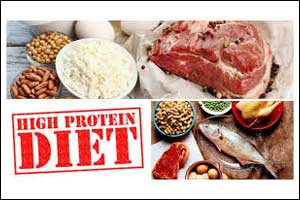- Home
- Editorial
- News
- Practice Guidelines
- Anesthesiology Guidelines
- Cancer Guidelines
- Cardiac Sciences Guidelines
- Critical Care Guidelines
- Dentistry Guidelines
- Dermatology Guidelines
- Diabetes and Endo Guidelines
- Diagnostics Guidelines
- ENT Guidelines
- Featured Practice Guidelines
- Gastroenterology Guidelines
- Geriatrics Guidelines
- Medicine Guidelines
- Nephrology Guidelines
- Neurosciences Guidelines
- Obs and Gynae Guidelines
- Ophthalmology Guidelines
- Orthopaedics Guidelines
- Paediatrics Guidelines
- Psychiatry Guidelines
- Pulmonology Guidelines
- Radiology Guidelines
- Surgery Guidelines
- Urology Guidelines
High-protein diet does not help control blood sugar and BP in diabetics, finds review

China: This is a known fact that obesity is a risk factor for type 2 diabetes (T2D) and a high-protein diet, being effective for weight loss could benefit diabetes patients. But a recent review published in the journal Clinical Nutrition has found high protein diet to be of no significant benefit in controlling blood sugar and blood pressure in patients with type 2 diabetes.
According to the study, high protein diet did not significantly improve blood sugar control, BP, and high-density lipoprotein (HDL) levels. But the diet did improve insulin resistance (IR) and lipid metabolism in T2D patients.
Almost two-thirds of diabetes patients are also affected by high blood pressure (hypertension). Elevated BP also increases the risk of diabetes development. Some recent studies have shown a high-protein diet to be effective for weight loss. Wai Chen, Peking Union Medical College, Beijing, China, and colleagues, therefore, determined whether a high-protein diet could help control blood sugar, mitigate IR and improve blood pressure by weight management in type 2 diabetes patients.
For the purpose, the researchers searched for electronic databases until May 1, 2018, and included all randomized controlled trials that compared a high protein diet with other diets. Either a fixed- or a random-effects model was used to combine the changes in each outcome from baseline to the end of the intervention. The meta-analysis was performed with RevMan 5.3 software.
Twelve articles (thirteen studies) including 1138 T2DM patients met the inclusion criteria.
Also Read: Higher fasting blood sugar variability increases risk of diabetes, CVD and death
Key findings include:
- Glycemic control was not significantly different between the high-protein diet and control group, with the changes in fasting plasma glucose (FPG) (−0.13 mmol/L) and HbA1c% (−0.05) from baseline to the end of the intervention.
- The difference in IR between the two groups was statistically significant. Most changes in lipids profiles were favourable.
- The changes in HDL, LDL, TC, and TG were +0.03 mmol/L, −0.10 mmol/L, −0.21 mmol/L and −0.19 mmol/L, respectively
- The result of HOMA-IR was −0.27.
- The difference in blood pressure in terms of systolic blood pressure (−0.57) and diastolic blood pressure (−0.73) was not significant.
Also Read: Blood sugar improves with low carbohydrate, high protein, high fat diet in diabetes, finds study
The researchers concluded that a high-protein diet does not significantly improve blood sugar control and blood pressure in diabetics."Our results showed that a high-protein diet does not significantly improve glycemic control and blood pressure, but can lower LDL, TC, TG and HOMA-IR levels in T2D patients. Further studies are needed to clarify the effects of a high-protein diet on glycemic control, insulin resistance and blood pressure control in T2D patients," concluded the authors.
To read the complete study log on to:
Effects of high-protein diet on glycemic control, insulin resistance and blood pressure in type 2 diabetes: A systematic review and meta-analysis of randomized controlled trials-https://doi.org/10.1016/j.clnu.2019.08.008

Disclaimer: This site is primarily intended for healthcare professionals. Any content/information on this website does not replace the advice of medical and/or health professionals and should not be construed as medical/diagnostic advice/endorsement or prescription. Use of this site is subject to our terms of use, privacy policy, advertisement policy. © 2020 Minerva Medical Treatment Pvt Ltd